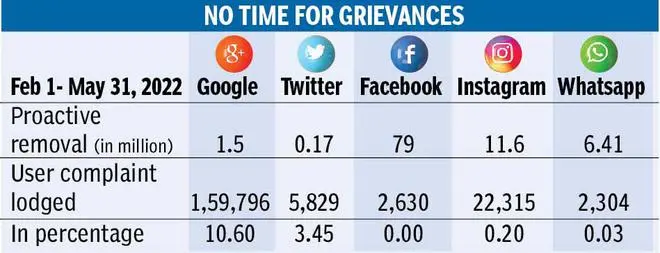Even as the Centre is planning to set up an appellate authority for content moderation, data released by tech giants show that only a minuscule number of users of social media actually lodged grievances. Social-media transparency reports show that user grievances account for a small fraction of all the content moderation done by big tech platforms such as Facebook, Twitter and Whatsapp. For instance, of the 17.5 million proactive content-moderation actions taken by Facebook, only 835 were user grievances. Internet experts note that the government needs to take action to ensure that social-media companies make their redressal mechanisms more accessible to users.
The Ministry of Electronics and Information and Technology released a fresh set of proposed amendments to the IT Rules 2021 last month, among which the need for an government appellate forum to address user grievances satisfactorily was floated. However, experts argue that instead of considering an appellate body, the government should ensure that users are able to easily submit their grievances with the social-media platform.

A key part of the IT rules 2021, proposed last year, was to make social-media companies more accountable, particularly in addressing user grievances on objectionable content and other issues users encountered while using the platform. This involved the assignment of a resident grievance officer as well as setting deadlines for a company’s resident grievance officer to acknowledge and dispose of a user’s grievances. Companies were also mandated to release monthly compliance reports, where the company’s overall content moderation actions, as well as total number of user grievances received, needed to be disclosed. Twelve months on, a very small fraction of users are lodging grievances with social-media platforms (a few hundreds),while the top platforms are pro actively culling millions of pieces of content every month.
BusinessLine analysed the past four months (February 1 to May 31) of transparency reports of Google, Twitter, Whatsapp, Instagram and Facebook. Google had the most number of grievances lodged by consumers, accounting for 10 per cent of the content, which Google proactively removed. Facebook was the worse-performing, which lodged only 2,630 (0.003 per cent) user grievances in the past four months; meanwhile, it removed almost 80 million pieces of content. This data is in line with Facebook’s own oversight body’s comments, which noted that India generally reports low user complaints. However, experts warn that given the differing nature of content in each of these platforms, they should not be compared with each other. Experts agree, however, that user complaints lodged each month are still very few.
Overall, across all platforms, BusinessLine analysed - user complaints lodged made 0.2 per cent of proactive takedowns by platforms- Google, Twitter, Whatsapp, Instagram and Facebook.
| 1 Feb- 31 May 22 | |||||
|---|---|---|---|---|---|
| Proactive removal | 1.5 million | 0.17 million | 79 million | 11.6 million | 6.41 million |
| User complaints | 159,796 | 5,829 | 2,630 | 22,315 | 2,304 |
| Percentage | 10.6% | 3.45% | 0.003% | 0.2% | 0.03% |
While experts attribute most of the content removed using automated means to spam, they agree that grievance redressal mechanisms for big tech need to be made more accessible. Anandita Mishra, Associate Litigation Counsel at the Internet Freedom Foundation, notes that the appellate committee that the government wants to set up will not drive further engagement as far as users lodging their grievances is concerned. “As per the amendments proposed, the committee will look at users appealing to the government, in case tech companies are not able to satisfactorily address their grievances. Therefore, social-media companies will remain the first point of contact for users always. However, this committee could increase the government’s hand in content moderation on these platforms even more. The government could moderate content, far beyond its mandate provided under the fundamental right to speech, by using this committee. It all depends on the composition of the committee ”
Moreover, the grievance redressal mechanism needs to become more accessible for Indian users. Amber Sinha, Executive Director at the Centre for Internet and Society, said: “Social-media platforms need to invest more resources to make lodging complaints more accessible. This will include the removal of the English language barrier, especially since for a majority of Indians on these social-media platforms, English is neither their first nor second language. Second, they also consider making the grievance redressal process more transparent and less automated, to motivate users to lodge their complaints. In most cases, users feel their grievances lodged are not making any impact, which demotivates the users from reporting.”




Comments
Comments have to be in English, and in full sentences. They cannot be abusive or personal. Please abide by our community guidelines for posting your comments.
We have migrated to a new commenting platform. If you are already a registered user of TheHindu Businessline and logged in, you may continue to engage with our articles. If you do not have an account please register and login to post comments. Users can access their older comments by logging into their accounts on Vuukle.